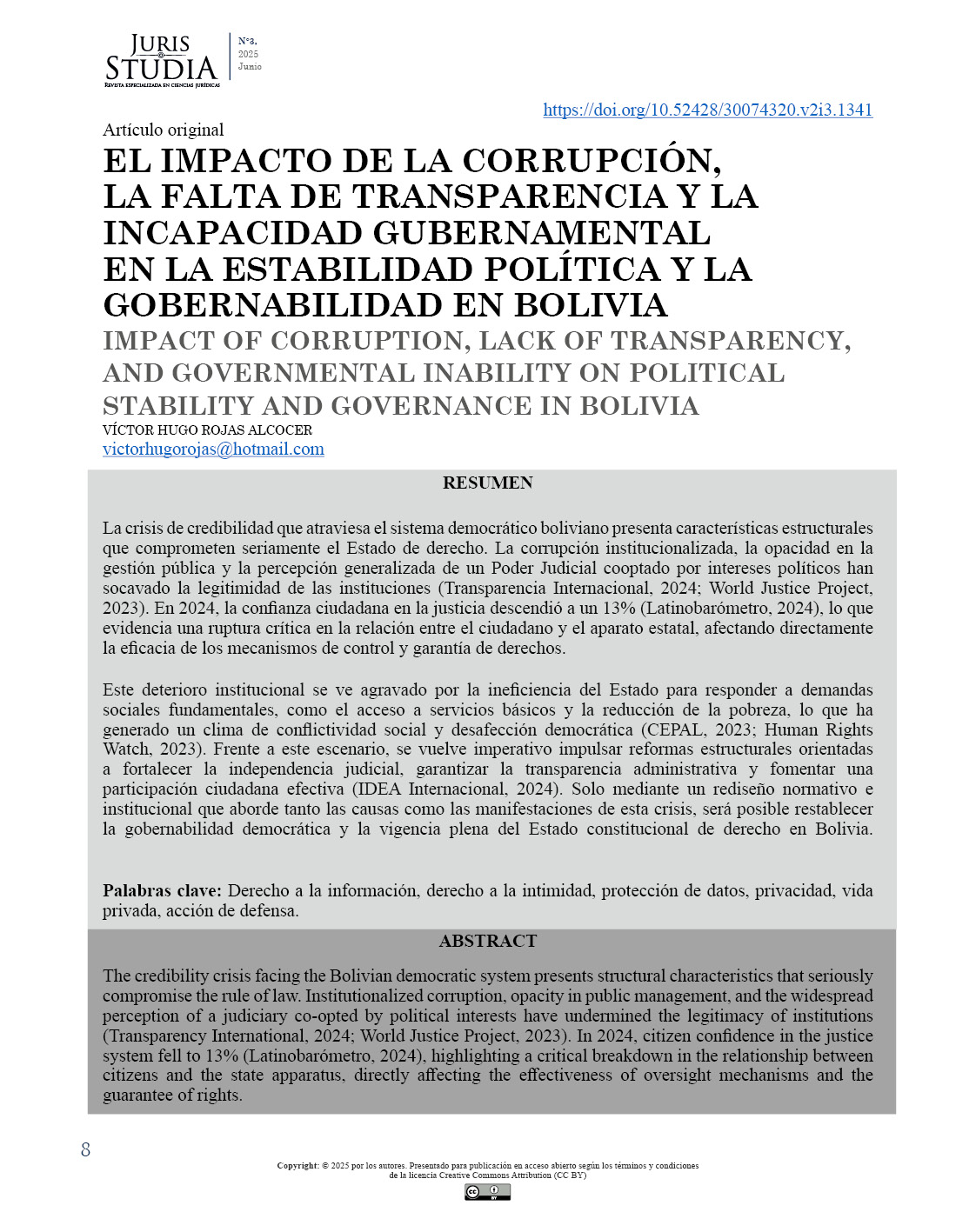EL IMPACTO DE LA CORRUPCIÓN, LA FALTA DE TRANSPARENCIA Y LA INCAPACIDAD GUBERNAMENTAL EN LA ESTABILIDAD POLÍTICA Y LA GOBERNABILIDAD EN BOLIVIA
Democracia y crisis de gobernabilidad
DOI:
https://doi.org/10.52428/30074320.v2i3.1341Palabras clave:
Corrupción, Transparencia, Gobernabilidad, Estabilidad política, BoliviaResumen
La crisis de credibilidad que atraviesa el sistema democrático boliviano presenta características estructurales que comprometen seriamente el Estado de derecho. La corrupción institucionalizada, la opacidad en la gestión pública y la percepción generalizada de un Poder Judicial cooptado por intereses políticos han socavado la legitimidad de las instituciones (Transparencia Internacional, 2024; World Justice Project, 2023). En 2024, la confianza ciudadana en la justicia descendió a un 13% (Latinobarómetro, 2024), lo que evidencia una ruptura crítica en la relación entre el ciudadano y el aparato estatal, afectando directamente la eficacia de los mecanismos de control y garantía de derechos. Este deterioro institucional se ve agravado por la ineficiencia del Estado para responder a demandas sociales fundamentales, como el acceso a servicios básicos y la reducción de la pobreza, lo que ha generado un clima de conflictividad social y desafección democrática (CEPAL, 2023; Human Rights Watch, 2023). Frente a este escenario, se vuelve imperativo impulsar reformas estructurales orientadas a fortalecer la independencia judicial, garantizar la transparencia administrativa y fomentar una participación ciudadana efectiva (IDEA Internacional, 2024). Solo mediante un rediseño normativo e institucional que aborde tanto las causas como las manifestaciones de esta crisis, será posible restablecer la gobernabilidad democrática y la vigencia plena del Estado constitucional de derecho en Bolivia.
Referencias
Albarracín, F. (2024). Crisis institucional y deterioro del Estado de derecho en Bolivia. Centro de Documentación e Información de Bolivia.
Banco Mundial. (2023). Informe sobre estabilidad política en América Latina 2023. https://www.bancomundial.org
Comisión Económica para América Latina y el Caribe (CEPAL). (2023). Estudio económico de Bolivia 2023. Naciones Unidas.
Comisión Económica para América Latina y el Caribe (CEPAL). (2024). Perspectivas fiscales y desafíos macroeconómicos en la región andina. Naciones Unidas.
Defensor del Pueblo de Bolivia. (2024). Mapa de conflictos sociales 2024. https://www.defensoria.gob.bo
Foro Económico Mundial. (2024). Informe de competitividad global 2024. https://www.weforum.org
Human Rights Watch. (2023). Informe anual sobre derechos humanos en Bolivia. https://www.hrw.org
IDEA Internacional. (2024). La calidad de la democracia en América Latina: Caso Bolivia. https://www.idea.int
Latinobarómetro. (2024). Informe anual 2024: Percepciones democráticas en América Latina. Corporación Latinobarómetro.
Lisperguer, H. [Entrevista]. (2025, enero 15). La Razón. https://www.la-razon.com
Organización de las Naciones Unidas (ONU). (2023). Informe sobre implementación de la Convención contra la Corrupción en Bolivia. https://www.unodc.org
Transparencia Internacional. (2024). Índice de Percepción de la Corrupción 2024. https://www.transparency.org
Uzquiano, M. (2024). Denuncia pública sobre minería ilegal en áreas protegidas. Servicio Nacional de Áreas Protegidas.
World Justice Project. (2023). Índice de Estado de Derecho 2023. https://worldjusticeproject.org

Descargas
Publicado
Número
Sección
Licencia
Derechos de autor 2025 Víctor Hugo Rojas Alcocer

Esta obra está bajo una licencia internacional Creative Commons Atribución 4.0.
Los autores/as que publiquen en esta revista aceptan las siguientes condiciones:
- Los autores/as conservan los derechos de autor y ceden a la revista el derecho de la primera publicación, con el trabajo registrado con la licencia de atribución de Creative Commons 4.0, que permite a terceros utilizar lo publicado siempre que mencionen la autoría del trabajo y a la primera publicación en esta revista.
- Los autores/as pueden realizar otros acuerdos contractuales independientes y adicionales para la distribución no exclusiva de la versión del artículo publicado en esta revista (p. ej., incluirlo en un repositorio institucional o publicarlo en un libro) siempre que indiquen claramente que el trabajo se publicó por primera vez en esta revista.
- Se permite y recomienda a los autores/as a compartir su trabajo en línea (por ejemplo: en repositorios institucionales o páginas web personales) antes y durante el proceso de envío del manuscrito, ya que puede conducir a intercambios productivos, a una mayor y más rápida citación del trabajo publicado.










